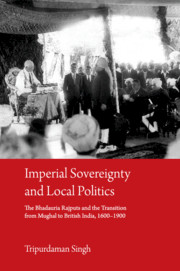 Imperial Sovereignty and Local Politics
Imperial Sovereignty and Local Politics Book contents
- Frontmatter
- Dedication
- Contents
- Acknowledgements
- List of Abbreviations
- Note on Transliterations
- Glossary of Commonly Used Indian Words
- Introduction
- 1 Integration into the Mughal System
- 2 Decline of the Mughals, Emergence of the Marathas
- 3 The Maratha Supremacy
- 4 The Rise of the Company Bahadur and the British Raj
- 5 The Uprising, the Bandit and Pax Britannica
- Conclusion
- Appendices
- Bibliography
- Index
5 - The Uprising, the Bandit and Pax Britannica
Published online by Cambridge University Press: 26 April 2019
- Frontmatter
- Dedication
- Contents
- Acknowledgements
- List of Abbreviations
- Note on Transliterations
- Glossary of Commonly Used Indian Words
- Introduction
- 1 Integration into the Mughal System
- 2 Decline of the Mughals, Emergence of the Marathas
- 3 The Maratha Supremacy
- 4 The Rise of the Company Bahadur and the British Raj
- 5 The Uprising, the Bandit and Pax Britannica
- Conclusion
- Appendices
- Bibliography
- Index
Summary
New revenue settlements, the refashioning of property relations, the firm territorialising of political authority, demarcation of more formalised political and social relationships and the intrusion of precise legal terminology into the polymorphous and multifaceted nature of Indian society and property, not to mention the multi-layered and shared nature of political authority, were processes of huge proportions and implications. In totality, all of these processes refashioned the way sovereignty was structured, understood and articulated at all levels in the political system. It was not just the development of a new vocabulary but also of a new grammar through which such political conversation took place, revolving around the practices that had created the reference points for the constitution of the symbolic and ritual realm.
For the Rajas of Bhadawar, and the other Bhadauria landholders, these processes had led to a rapid change in their social, political and economic positions along with corresponding changes in the functions that they had played not simply in society but also in the political hierarchy and in the symbolic links they had with the imperial state. The transformation of the raja from a ‘lesser ruler’ to what would essentially be termed a kind of ‘landed aristocrat’ and the resultant transformation of his relations with the central power, and the reflection of this process in the way the British state saw these subordinate groups, and the methods of their engagement with them, created a hermeneutic relationship through which sovereignty was re-examined and refashioned.
The ideological and symbolic manifestations of sovereignty, in other words, the processes and rituals that created and animated the symbolic realm, were a distinguishing feature of the way the Mughal state had been able to incorporate intermediate power holders into its orbit. The conceptions that underpinned these processes also provided the ground for the creation of a political framework to reflect and express these ideas. For the British state, the building of legitimacy went hand in hand with the appropriation of this symbolic realm, and the incorporation of others into this realm. It was the creation and sustenance of this realm that created the ideological power that could, and indeed did, fundamentally alter the conceptual basis of the symbolic realm that the British appropriated. Appropriating Mughal sovereignty, they refashioned and reinterpreted it in their own ways.
- Type
- Chapter
- Information
- Imperial Sovereignty and Local PoliticsThe Bhadauria Rajputs and the Transition from Mughal to British India, 1600–1900, pp. 162 - 199Publisher: Cambridge University PressPrint publication year: 2019


